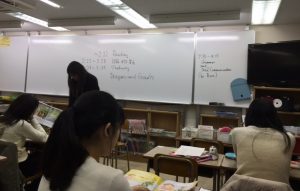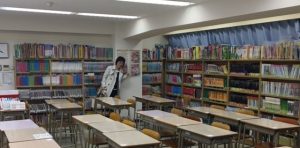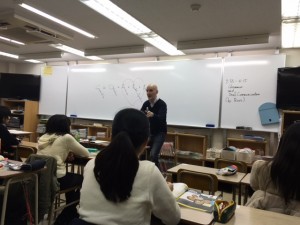Yoko Yamato (CERC Associate Member, resident in Tokyo) and Zhang Wei (CERC Secretary and Postdoctoral Fellow) are conducting research on shadow education in Japan. This includes interviews with stakeholders in the industry, and visits to a number of jukus.
One of these jukus is called The Scientific Education Group (SEG). The company was formed in the 1980, and has established a strong reputation. Below are some observations from a visit in December 2015.
The visit to SEG and observation of the combined classes of Extended Reading cum grammar and oral communication completely changed our impressions of English classes that may be conducted in jukus. The stereotype image of English tutoring classes is of a teacher explaining the grammar of selected sentences and getting the idea of a paragraph in Japanese, with students taking notes while listening. ‘Reading’ classes often turn out to be translation classes in which no real reading is involved. Since SEG’s Extensive Reading class has Reading in its name, we had been wondering what technique the instructor would use. It was eye-opening and indeed interesting: more like individual reading time for students.
What distinguished the class from independent reading in a library was that the books were  provided by the instructor rather than being selected by the students themselves. Further, each student was given a CD player on which they listened to the CD which accompanied the book they were reading. The teacher closely checked each student’s reading progress, and selected books for next reading. This left the teacher no time to sit and rest, but was possible in a class of 11 students. The teacher’s major role was not to deliver knowledge but to screen useful learning materials, to monitor and to guide.
provided by the instructor rather than being selected by the students themselves. Further, each student was given a CD player on which they listened to the CD which accompanied the book they were reading. The teacher closely checked each student’s reading progress, and selected books for next reading. This left the teacher no time to sit and rest, but was possible in a class of 11 students. The teacher’s major role was not to deliver knowledge but to screen useful learning materials, to monitor and to guide.
‘Book whisperer’ is the term Donalyn Miller, the author of The Book Whisperer: Awakening the Inner Reader in Every Child gave to this form of instruction. The class we observed was for Grade 7, when students first start learning English at school as a ‘subject’, though some private mainstream schools may have already introduced English from primary level. Public primary schools introduce English as ‘activities in another language’, not a subject at upper grades (though the contents, timing and syllabus differ from school to school). Students in the SEG class we observed seemed to enjoy reading silently while listening to the recording of the book or reading aloud in soft voice along with the CD. At the very beginning most students were just listening quietly, but later a boy started to follow loudly. Some other students were affected, and did the same. We attended an ER class conducted by Mr. Furukawa, the founder of SEG, and he said that students were free to read books in their own manner.
 The range of books in this particular classroom was mainly for pre-primary to lower primary school children in the countries where English is the native language. The shelves supported as many as 20,000 books. As the grade progressed, so did the range of the books – even reaching unabridged Harry Potter books. Mr. Furukawa indicated that SEG invests US$500,000 on books every year. Close records of a student’s reading progress are also necessary. A handbook had been given to each student at the beginning of the program to track the books that had been read and the students’ reflections. The handbook is as much a reference for the teacher as a notebook for the students and a form of feedback to the parents.
The range of books in this particular classroom was mainly for pre-primary to lower primary school children in the countries where English is the native language. The shelves supported as many as 20,000 books. As the grade progressed, so did the range of the books – even reaching unabridged Harry Potter books. Mr. Furukawa indicated that SEG invests US$500,000 on books every year. Close records of a student’s reading progress are also necessary. A handbook had been given to each student at the beginning of the program to track the books that had been read and the students’ reflections. The handbook is as much a reference for the teacher as a notebook for the students and a form of feedback to the parents.
The second half of the class was conducted by a British native speaker. It combined grammar, reading comprehension and writing. The instructor made use of Total Physical Response Storytelling (TPRS), involving the students actively by letting them make stories for the writing activities which followed. It was quite a task to open the students’ mouths, partly because the class was on the fourth day of a five-day special session for the winter holiday. Japanese students are seldom willing to express their ideas in public.
 The teacher had to be an actor, entertainer, moderator, director and facilitator. He tried hard to make fun of himself and to cheer the students with body language. Sometimes students were not able to respond to his questions, and he would ask alternative questions in order to squeeze one or two words from them. He was good at using familiar examples, for instance about typical conversations when friends greet each other. This ended with a formula which students could use with anyone they intend to be friend and with a big heart on it (see photo).
The teacher had to be an actor, entertainer, moderator, director and facilitator. He tried hard to make fun of himself and to cheer the students with body language. Sometimes students were not able to respond to his questions, and he would ask alternative questions in order to squeeze one or two words from them. He was good at using familiar examples, for instance about typical conversations when friends greet each other. This ended with a formula which students could use with anyone they intend to be friend and with a big heart on it (see photo).
As we observed, and learned from the students’ evaluations, the teacher was patient and ‘interesting’. His grammatical points did not seem to come in order of mainstream school syllabus and may not cover the entire grammar the students need to study in their schooling. The juku teachers can enjoy much freedom of teaching, partly because jukus are companies rather than public organisations subject to accountability requirements.
After the class, we talked with the teachers. The books levels are indeed lower than the students’ age levels, as they are picture books for pre-primary and lower primary students in English-speaking countries. But the students were learning to read books in a foreign language without consulting dictionaries, and the program enabled them to progress from easier to more difficult books.
Such reading of course can also be undertaken at home or in a library (which was our idea of how spare time can and should be spent, provided that a great number of good books are available). But SEG provided an atmosphere with peer influence and easily-accessible and carefully selected materials. The teacher felt that parents could provide the environment, but the approach would usually fail because they would usually give their children more difficult books than the children could read with pleasure. Because it is not examination-oriented, the Grade 7 students were able to enjoy their reading with little stress from time and the obligation to meet certain standards.
We were impressed that Mr. Furukawa, the founder, head instructor of ER and the president of SEG, was not looking for a short-term solution for passing an examination but a life-long mission of education: learning to learn, and learning to do. This applied not only to English but also to his own major, mathematics. Extensive reading can certainly equip students with solid foundations of a language, but it takes time. With such an approach some students might hit bottlenecks during the process so as to give up the practice. However, once they have the challenges, they may become more competent to learn the language independently and enjoy learning.
Yoko Yamato and Zhang Wei
6 January 2016
















